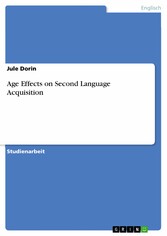Suchen und Finden
Age Effects on Second Language Acquisition
Studienarbeit aus dem Jahr 2015 im Fachbereich Anglistik - Linguistik, Note: 1,7, Universität Paderborn, Veranstaltung: Second Language Acquisition, Sprache: Deutsch, Abstract: It is a widespread belief that the acquisition of a foreign language is much easier for children rather than for adults. It is said that the younger the learner, the better the outcome will be. The same applies for the assumption that an adult learner of a foreign language cannot reach native-like competence, no matter how long the process of acquisition will take, whereas a child indeed can acquire a perfect language without even the hint of a foreign accent. Furthermore, there is a common notion that the age of onset of the acquisition of a second language plays a role in it's further development. Indeed, the acquisition of a foreign language can be a frustrating and very tough experience for adults in, whereas it seems to be a facile and fast proceeding process for children or adolescents. A possible answer to these beliefs may be found in the Critical Period Hypothesis, which states that the age is a major factor for second language acquisition (henceforth SLA) and that there is a time span, where the acquisition of a language functions best. On the other hand, there are studies which want to make clear that in fact, the contrary is true or as well that age has no influence at all when it comes to SLA. This paper aims to find out if there indeed is a connection between the learner's age and his level of proficiency in the L2.
Alle Preise verstehen sich inklusive der gesetzlichen MwSt.













